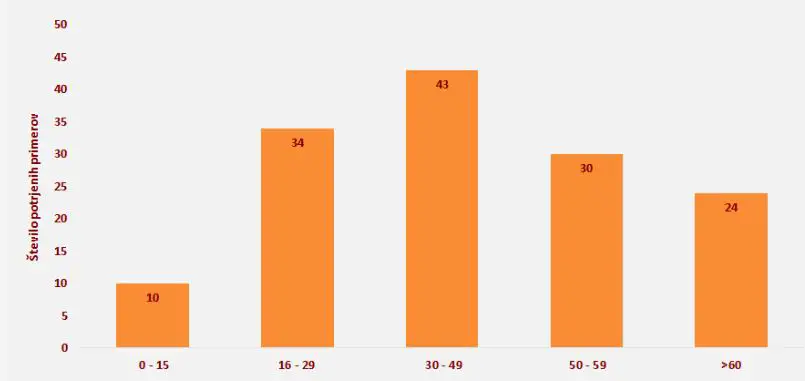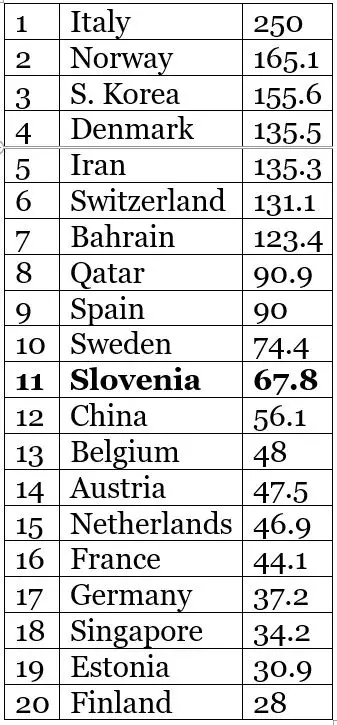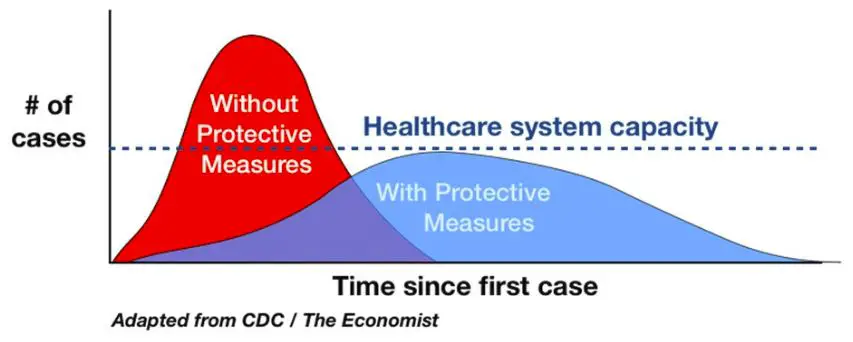Lifestyle
Want to keep up with the numbers on COVID-19 and Slovenia in an easy to digest form, while also giving your Slovene a mild work out? Then bookmark this page from the National Institute of Public Health (Nacionalni inštitut za javno zdravjeh). It seems to be updated every afternoon, and shows the number of confirmed cases by age and gender, along with the location, by statistical region, where they reside. The image at the top of the story and the following screenshots are from today, so if here after 13 March just follow this link for the latest data.
All our stories on Slovenia and coronavirus are here, so also bookmark that link if you want to keep abreast of any and all developments on that issue.
Using the latest available figures (as of early afternoon, 13 March), Slovenia has 141 confirmed cases of COVID-19, with most being in Ljubljana. China still has the record, with 80,815, and Italy’s in second place with 15,113. But what do those numbers mean when taking into account the respective population sizes, and how does Slovenia compare globally?
To answer this we turned to the data collected and organised by worldometers.info’s dedicated coronavirus page, a site run by “an international team of developers, researchers, and volunteers with the goal of making world statistics available in a thought-provoking and time relevant format to a wide audience around the world”, and what seems to be a legitimate operation with up to date information. It’s here, after scrolling down to the data table, that we can see the number of confirmed cases per 1 million people, and find that Slovenia currently ranks 11th in world, with 67.8, between Sweden (74.4) and China (56.1).
The number of confirmed cases per 1 million people
However, Slovenia also ranks high in testing, having carried out a total of 4,346 tests for the virus at the time of writing, or around 2,170 per million residents. This compares with a total of 13,953 tests in the United States, or just 42.6 tests per million residents.
Related: How many hospital beds are there in Slovenia?
You can find all our stories on coronavirus and Slovenia here
At 14:00 the number of people in Slovenian who tested positive for COVID-19 was 141, and 4,346 tests have been performed. The National Institute of Public Health director Nina Pirnat explained that the regional distribution of cases was not yet available, but that the rising numbers are pointing towards Ljubljana.
She also stated that the pandemic has now entered the second phase in which the main goal is to make it possible for the health system to offer health care to every patient who is going to need it. Measures that are preventing social contacts among citizens have therefore been put in place in order to slow down the spread of the disease.
Pirnat also called on parents to make sure their children don't meet outside in bars and coffeeshops, now that the schools have been shut down, and that people should refrain from visiting nursing homes and thereby prevent the disease from entering the more vulnerable individuals inside. It is important that physical distance among people is maintained while outdoors as well.
Simona Repar Bornšek, state secretary at the Ministry of Health, explained that they were aware of cases of sick people in their homes, who are almost certainly infected but will not be tested as it doesn’t seem to be necessary. She mentioned the current system of taking swabs is overloaded and that new testing measures will be introduced soon.
Repar Bornšek also announced new measures within the health system, which will be introduced on Monday: all specialist examinations, surgeries, rehabilitations and other non-urgent health procedures will be cancelled except for cancer patients and pregnant women. Dentistry is cancelled by Monday as well, while seven emergency points for urgent cases will be introduced, although the locations were not announced.
She added that all government services are being shut down for two weeks in an attempt to avoid reaching a maximum load on the health system at once.
As for the question of who will be looking after younger school children whose schools shut on Monday, the state secretary at the Ministry of Education Martina Vuk explained that a decree has been signed which provides day care only for children of parents who are obligated to provide support in critical infrastructure or national security sectors. Such care will be provided to children in fifth grade and younger.
STA, 13 March 2020 - Seeing people rush to grocery stores for large purchases in recent days, the country's top officials are trying to assuage fears about food supply. The supply of essential goods is stable and reserves are being replenished or expanded where disruptions are expected, Agriculture and Food Minister Aleksandra Pivec says.
"We are presently not in a situation where large supply disruptions, with the exception of a few products perhaps, would be expected," Pivec told the 24ur evening news shows on POP TV on Thursday.
It is possible some alternative choices will have to be made in some cases, she added, while noting that "when it comes to meat, Slovenia does not have these problems". "If the supply with pork will be disrupted, chicken and beef will have to be resorted to," she illustrated.
Pivec, who is to stay on as agriculture, food and forestry minister in the Janez Janša government expected to be confirmed later today, said Slovenia's reserves secured supply with basic necessities for three months and that they were currently being replenished and expanded.
Outgoing PM Marjan Šarec also sees no reason for concern, telling TV Slovenija late on Thursday that "in case the tougher conditions persist for long, some tropical fruits will be in short supply". "But the important thing is that basic foodstuffs will be there and there is enough in the reserves."
His successor Janez Janša, who has indicated Slovenia will go into lockdown mode once his government takes over, called on people on Thursday to show restraint. He agrees it does make sense to create some reserves so as not to have to go to shopping centres every day, but overdoing it leads to others ending up empty-handed.
Janša said the state reserves will take care of the most urgent needs even if supply was disrupted for weeks or months, while he also announced the government would buy milk surpluses among other things.
The new government does not plan to close down shopping centres, with Janša arguing people are not ready for this and that it is not possible to activate alternative supply routes so quickly, even though these are being prepared.
All our stories on COVID-19 and Slovenia are here, so bookmark that link and we'll post news when we have it
St. Gregory's day is Slovenian St. Valentine's, a day of lovers, as according to folk traditions this is the day of bird nesting. Unmarried girls thus would look into the sky on this day, as the first bird they saw would suggest what their future husband would be like.
St Gregory's is named after Pope Saint Gregory the Great (app. 540 - 604), who according to folk traditions brings spring, light and the sun.
Until 1582, when the Gregorian calendar was introduced, the first day of spring was marked on March 12.
On March 12 there was already light enough that the blacksmiths of Kropa did not need torches or candles for their work anymore, which they celebrated by throwing burning objects into the local stream, which later evolved into children sending little ships and huts (little gregories) down the water.
In these days let the road take you to ? Tržič, where during ? Gregorjevo (Saint Gregory´s Day) there's a habit of send lights down the river ?️, which is 100 of years old. @visit_trzichttps://t.co/hX6gBnNWXn#ifeelsLOVEnia #itsculturetime pic.twitter.com/82tKgj0MQw
— Feel Slovenia (@SloveniaInfo) March 9, 2020
Updated at 13:50
STA, 12 March 2020 - Outgoing Prime Minister Marjan Šarec announced on Thursday he had tasked the health and education ministries with making all the necessary preparations for the closing down of all schools in Slovenia in the face of coronavirus as of Monday.
"It's a measure that will have many consequences but it is a must in this situation," Šarec said on Twitter.
Ministry of Education data show over 260,000 children and youngsters will have to stay home.
Outgoing Labour Minister Ksenija Klampfer said those who would be forced to stay at home to look after their children would receive compensation in the amount of 50% of pay.
Tomorrow, only child care will be organised at schools, so children are advised to stay at home if possible, Education Minister Jernej Pikalo said.
He added that options were being discussed for long-distance learning with public broadcaster RTV Slovenija, internet provider for public institutions Arnes and other stakeholders.
Outgoing Health Minister Aleš Šabeder warned that the measure would also affect the healthcare system, as many medical workers who have children will have to stay at home. He said measures to reorganise work at health institutions were already in the making.
Since the virus has spread to all of Slovenia's regions and the number of infected persons is rising, the country will declare an epidemic today.
Two schools where infections have been confirmed are already closed.
The first to close was the Fran Albreht Primary School in Kamnik on Wednesday, where a teacher had tested positive for the virus.
Two cases were also confirmed at the Šmarje pri Jelšah primary school, which is closed as of today.
Several European countries have opted for school and kindergarten closures to prevent the spreading of the new virus, including Austria as on next week and partly Croatia.
In Italy, which is the European coronavirus hotspot, schools have been closed since 5 March.
University lectures at the University of Primorska were cancelled for the next two weeks on Sunday, while the University of Ljubljana cancelled them on Wednesday until further notice.
At the University of Maribor only lectures with less than 100 people are allowed, while some faculties have opted for distance learning.
The government introduced several protective measures in the last few days to contain the virus, which has so far infected at least 82 people in Slovenia. Indoor events with more than 100 visitors are banned and health checks have been put in place on the border with Italy. The checking of passengers at Ljubljana airport is to start in the coming days.
All our stories on coronavirus are here
STA, 11 March 2020 - The number of confirmed coronavirus cases in Slovenia rose by 23 since Tuesday afternoon to 57 by 2pm on Wednesday. The first school was closed after a teacher tested positive and strict measures were put in place at the Ljubljana maternity hospital where several cases were confirmed as well. So far, 2,270 persons have been tested.
The Fran Albreht Primary School in Kamnik has been closed for two weeks after a teacher tested positive, but Education Minister Jernej Pikalo announced that "given the large number of negative effects on the life of the community and on the economy, the closure of schools is a measure we will be using only after careful reflection and consultations with experts".
New confirmed cases, standing at six at the time of a press conference held at noon, were reported for UKC Ljubljana. According to the hospital's director Janez Poklukar, the infected are mostly part of UKC's leadership and have had little contact with patients.
However, with five case reported for the hospital's gynaecology department, restrictions were upgraded there - fathers will for instance not be able to be present during birth, and all non-urgent check-ups will be cancelled. The dental clinic also has one confirmed case and is operating in restricted mode.
Šabeder explained that all preventive programmes in the healthcare system would be put on hold and staff relocated to where it is needed most.
The government has also decided to put head of the Civil Protection and Disaster Relief Administration Srečko Šestan in charge of efforts to contain the virus.
Meanwhile, National Public Health Institute (NIJZ) director Nina Pirnat explained the institute was following all primary infections, while it was also noticing secondary, tertiary and quandary transmissions.
She reported that one infection had also been confirmed among the residents of the Metlika (SE) elderly home.
The UKC Ljubljana hospital said on Twitter today, it was treating 20 coronavirus patients at the moment.
While Slovenia remains without a death case due to coronavirus, one of the first individuals to test positive was transferred to intensive care today. However, UKC director Janez Poklukar explained that the patient was in critical condition because of a different issue, although the virus was not helping.
The other 19 patients are stable and at least two of them are expected to be released to home care soon, the hospital said.
UKC Maribor medical director Matjaž Vogrin said that all the patients hospitalised over COVID-19 in Slovenia were experiencing milder symptoms of the disease and that nobody needed intensive care for now.
All our stories on coronavirus and Slovenia are here
The danger of complacency over COVID-19 is that the infection spreads too quickly and hospital beds, along with healthcare workers’ schedules, get full to capacity, leaving little or nothing for patients with other conditions. This raises the possibility – as seen in Italy – of the system thus focusing attention on those most likely to recover, and letting the illness take its course among others (the older, the sicker).
All our coronavirus stories are here
In short, if you’re young and in general good health, your personal safety should not be a concern. More important is the safety of those around you – the old and sick who are more likely to die from COVID-19, as well as those, yourself included, who might need an emergency trip to the hospital in the next few months. The idea, as expressed in this widely shared image, is to spread out the epidemic and not overwhelm the healthcare system, both formal and informal.
But how many hospital beds are there in Slovenia, and how do the numbers compare with other countries?
Using Eurostat data for 2017, there are a total of 2.6 million hospital beds in the EU28 (including the UK), counting those for curative care, long-term care and rehabilitative care, of which just 9,294 are in Slovenia, compared to 661,448 in Germany. Of course, Slovenia has a much smaller population, two million vs 82.8 million, so let’s look at the number of hospital beds per 100,000 people. Here Germany has 800 beds for every 100,000 people, or eight for every 1,000. In contrast, Slovenia has 449 beds for every 100,000 residents, or 4.49 for every 1,000, just between Malta and Switzerland.
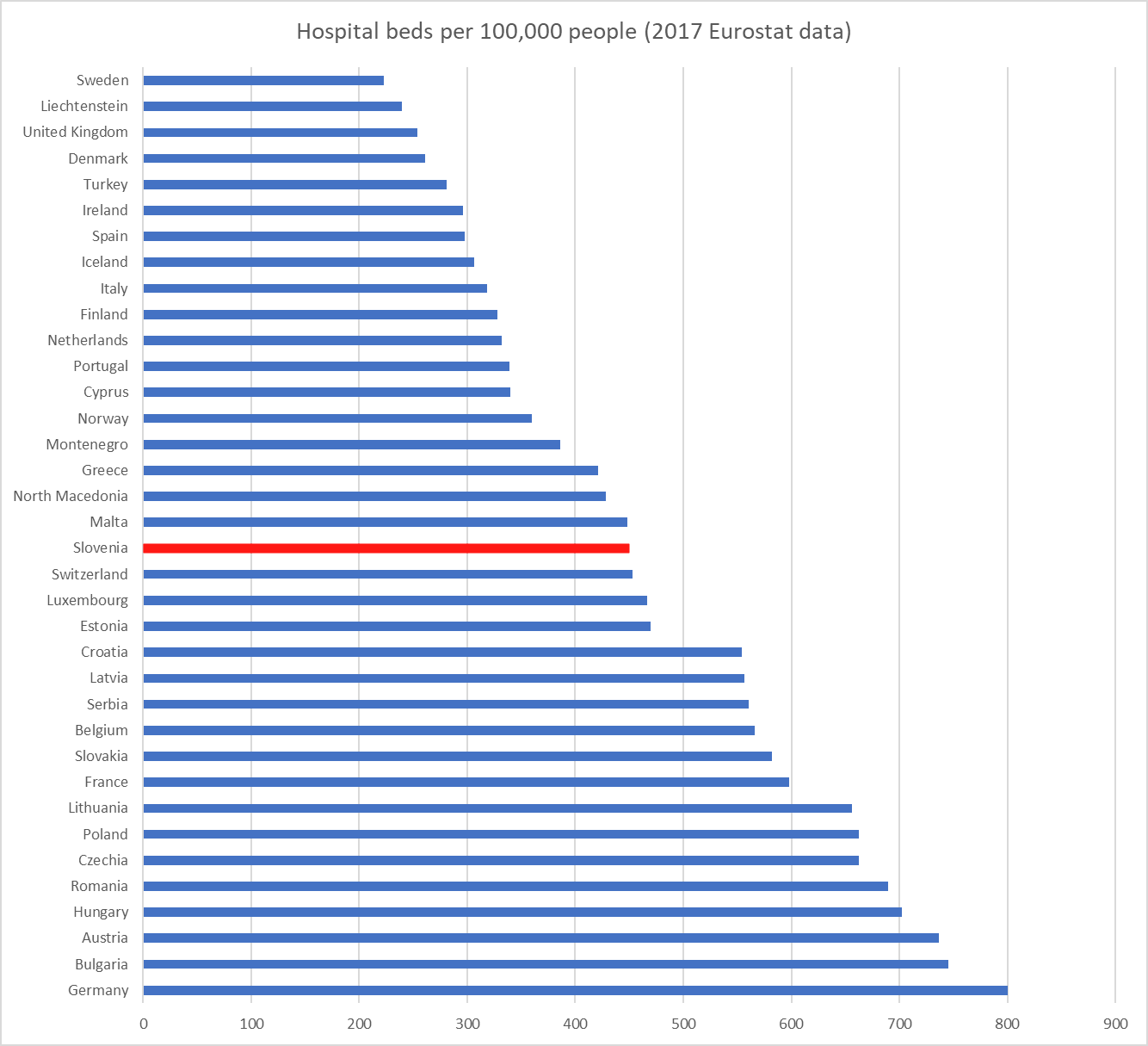
The full list of countries, and beds per 100,000 people, is shown below, and note that no data was given for Albania. The Eurostat data can be explored further here.
Austria | 737 |
Belgium | 566 |
Bulgaria | 745 |
Croatia | 554 |
Cyprus | 340 |
Czechia | 663 |
Denmark | 261 |
Estonia | 469 |
Finland | 328 |
France | 598 |
Germany | 800 |
Greece | 421 |
Hungary | 702 |
Iceland | 306 |
Ireland | 296 |
Italy | 318 |
Latvia | 557 |
Liechtenstein | 240 |
Lithuania | 656 |
Luxembourg | 466 |
Malta | 449 |
Montenegro | 386 |
Netherlands | 332 |
North Macedonia | 428 |
Norway | 360 |
Poland | 662 |
Portugal | 339 |
Romania | 689 |
Serbia | 561 |
Slovakia | 582 |
Slovenia | 450 |
Spain | 297 |
Sweden | 222 |
Switzerland | 453 |
Turkey | 281 |
United Kingdom | 254 |
STA, 10 March 2020 - The number of confirmed cases of coronavirus in Slovenia rose to 31 by midday Tuesday, the Health Ministry said. The first patients confirmed to have been infected with COVID-19 will be released from hospital shortly to free up capacity for potentially more serious cases.
The latest figure marks an increase from 25 confirmed cases recorded on Monday. Almost 1,500 people have been tested, according to Health Minister Aleš Šabeder.
A total of 18 patients are currently at the infectious disease ward of the UKC Ljubljana hospital. Five will be sent home today with instructions to remain in isolation. They will be subject to strict medical checks while at home, said Tatjana Lejko Zupanc, the head of UKC Ljubljana's infectious disease clinic.
The new cases are related to previously confirmed cases. A total of 17 people have been infected abroad and 14 are the result of community transmission.
The hardest hit regions for now are Ljubljana with 15 cases and Dolenjska with ten. The authorities are not disclosing the details but media reports suggest the Dolenjska cases are related to a single doctor from Metlika who came to work after he was infected.
One doctor working at UKC Ljubljana has been infected as well but he was removed from his post immediately and did not come into contact with patients, according to Eva Grilc of the National Institute of Public Health.
New measures to contain spread of coronavirus in Slovenia
As the number of cases rises, the authorities are planning new measures to contain the spread of the virus. Spot checks on the border with Italy were announced on Monday and should be deployed within a few days, once the details are hashed out, said Šabeder.
Similarly, plans for temperature screening at Ljubljana Jože Pučnik Airport are to be finalised soon.
The government has already issued a ban on indoor gatherings that include more than 100 people. There are a few exemptions, including shopping malls, weddings and funerals.
As a result of the ban, university lectures in large lecture halls have been cancelled for the next two weeks. Instruction will be provided online.
Meanwhile, Agriculture, Food and Forestry Minister Aleksandra Pivec stressed today that the supply of food products in Slovenia was not disrupted or in peril.
Pivec explained the quarantine regime in Italy was causing problems primarily for Slovenia milk exporters, while she called on Slovenian consumers to pick Slovenian products so as to provide additional support to Slovenian producers.
All our stories on coronavirus and Slovenia are here
Last Wednesday, March 4, two citizens of Georgia were brought to the investigative judge in Kranj on suspicion of several burglaries in the area of Škofja Loka. The suspects were recognised and apprehended earlier on Monday by the officers of the Police Directorate Maribor, who handed them over to their colleagues in Kranj. The police also confiscated a significant number of stolen items (see in the pictures below).
The burglars used threads to learn whether people were at home or not. About 250 apartments in five buildings were found out to be equipped with such threads. A very clear video of the perpetrators at work was posted on Police Directorate Kranj’s Facebook site, but it has already been taken down following the arrests.
The police investigation will now look into links with similar burglaries across Slovenia and other EU member states.
"The arrested Georgian citizens are most likely members of a bigger organised criminal group, engaged in property crimes throughout the European Union. We can say that this is most likely a minor tentacle in the overall structure of the group," explained Benjamin Franca of the Criminal Police Directorate. This is the second group of Georgian burglars that have been arrested by Slovenian police this month.
On February 25, police apprehended a citizen of Georgia and confiscated his burglary tools. He was detained, and after further information was collected the police found out that he had just committed a burglary at an apartment in Celje. Later in the same day, two other Georgian citizens were arrested in connection with the suspected burglary. All three were taken to an investigating judge who ordered one of the three to be placed in custody. This group was already active in the area monitored by the Celje Police Directorate in August 2019, when two burglaries were carried out.
Benjamin Franca from the Criminal Police Administration stated that "the police are constantly detecting the presence of the so-called mobile crime groups committing property crimes,". Some of the burglaries are attributed specifically to groups from abroad that are very well organised. In Slovenia members of criminal groups, who come mainly from Eastern European countries and the Central Balkans, are committing property crimes such as theft, burglary, highway burglary, and ATM attacks.
The main target countries of these groups’ operations are Western and Northern European countries, where the standard of living is higher, and thus there is more to steal. Criminal groups in a certain area commit as many crimes as possible and leave the country as soon as possible. They continue to carry out their actions in another country and so on.
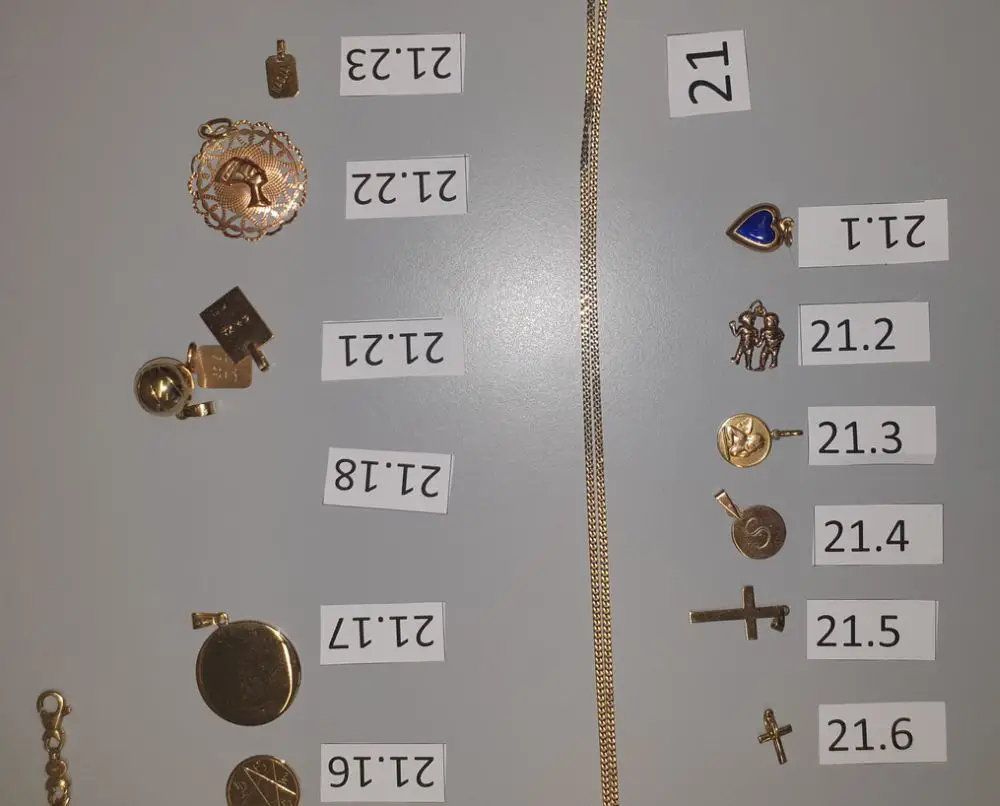
For more pictures of confiscated stolen goods visit policija.si. Possible owners should call police station at Škofja Loka (04) 502 37 00 and make an appointment. Proofs of ownership should be brought with you.
Spring is at the door and Open Kitchen is getting ready to enter the new season on Friday, March 20, at Pogačar Square in Ljubljana. And, being an open-air event, is not covered by the official ban on indoor events with more than 500 people.

The new season of Open Kitchen aims to be plastic free, introducing instead biodegradable and recyclable food and drink containers. Visitors will also be encouraged to bring their own reusable equipment with them. “We have already introduced many measures that contribute to the sustainability of the event in previous years, but now we are going to the end. As the biggest culinary event and one of the most visited tourist attractions, we want to act as initiators of sustainable public events,” announced, Open Kitchen co-founders Alma and Lior Kochavy in a press release before the start of the new season.

The Open Kitchen events in Slovenia are visited by hundreds of thousands of people each season, who together enjoy to a million servings of food. Plates, bowls, knives, forks and spoons have been made of biodegradable materials for several years now, thus saving us an environmental burden of millions of pieces of plastic. In order to reduce the environmental impact of the Open Kitchen even more, a great deal of attention has been paid to the proper segregation of waste. In Ljubljana, Open Kitchen cooperates with the consultants from Voka Snaga, while Slovenian Philanthropy takes over unused ingredients and dishes after every event in the capital, and distributes them to those in need. In Celje food surpluses are taken care of by Socio Institute.

In addition to the complete elimination of plastics, another innovation is being prepared for this year, a green stall where visitors will be able to buy containers, accessories and other reusable food and storage related items. “When we started the Open Kitchen eight years ago, we begun with an idea that visitors of the event could get home-cooked food, thus relieving themselves from cooking for the weekend. The new offer of reusable packaging will make it even easier,” said Alma Kochavy.
Waste from the Open Kitchen, which mostly consists of biodegradables, will be handled by the Ljubljana Regional Waste Management Center (RCERO Ljubljana). Utilizing state-of-the-art and sustainable waste management technology on a European scale, waste will be reclaimed there for compost, electricity and heat. In other cities where Open Kitchen is hosted, further waste treatment is carried out in collaboration with local utilities and collection centers.


